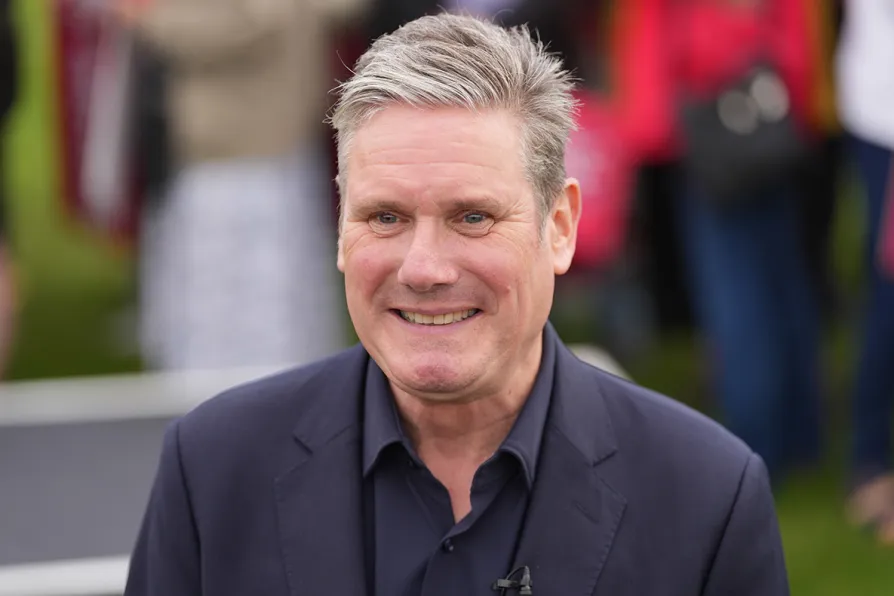
 Labour leader Sir Keir Starmer at Selby football club, North Yorkshire, after Labour candidate Keir Mather won the Selby and Ainsty by-election, July 21, 2023
Labour leader Sir Keir Starmer at Selby football club, North Yorkshire, after Labour candidate Keir Mather won the Selby and Ainsty by-election, July 21, 2023
WE CAN be grateful to Sir Keir Starmer for defining the parameters of Labour’s policy offer.
Last week he quipped: “We are doing something wrong if policies from the Labour Party end up on every Tory leaflet.”
In choosing the grounds on which to contest Starmer’s intransigent resolve to say or do nothing which might invite criticism or comment from the Conservative Party, trade unions have a veritable feast of issues on which to offer alternatives to the ruling class consensus that now determines Labour’s policy choices.
The party’s national policy forum has already produced a sharp controversy over the extent to which the leadership are prepared maintain the industrial relations framework bequeathed us by successive New Labour, Conservative and Tory-Lib Dem coalition governments.
When Tony Blair failed to reform of Thatcher’s anti-union laws, some unions remained ever-hopeful and loyal.
Serial disappointment followed and apart from the brief interregnum when Labour’s 2017 and 2019 election manifestos offered a restoration of trade union and employment rights, the present period has been characterised firstly by Starmer’s mendacious and quickly betrayed promise to continue Jeremy Corbyn’s policy; his successive evasions and reverses since and now a sharp enough repudiation of the affiliated unions’ proposals to produce a trade union walkout from the national policy forum.
Starmer’s pitch to the forum is that the party cannot commit to unfunded spending pledges. This, in effect, is an endorsement of Tory economic policies because a Labour government is not committed to continue the spending policies of the Tories but can make up its own mind on these questions.
The unions are minded to make an issue of the demand for a £15 minimum wage as well as demanding an end to the two-child limit on child benefit.
Of course, raising the minimum wage would boost government coffers because a big chunk of pay comes back in the form of income tax, National Insurance, VAT on the stuff working people need to buy and the tax on profits that the corporations that make and sell the things working people need to buy.
Ending the child benefit cap — among the most pernicious of George Osborne’s austerity policies — would cost £1.3 billion a year and would give 250,000 children a boost out of family poverty. It would help the families of another 850,000 of our kids.
For comparison, Britain has given Ukraine — with its notoriously corrupt banking sector — £1.3bn in fiscal support including loan guarantees.
Just last month the Financial Times reported that a legal effort by Ukraine’s largest bank to recover billions of dollars in assets from its former oligarch owners opened in England’s High Court on Monday — in a fraud trial that has become a test of Kiev’s commitment to tackling corruption.
£1.3bn is a magic figure. Boris Johnson pledged this precise amount to Volodymyr Zelensky when he popped over to Ukraine in 2022.
Governments can decide what to spend money on and there is no hint from the ennobled Labour leader that he harbours any sense that the government plans to increase the royal family’s grant by 45 per cent, from £86 million to £125m might require some pruning by a Labour government.
Labour’s affiliated trade unions are now faced with a clear choice. Accept the direction of travel made clear by the Labour leader or find the unity and allies that can change the composition of the leadership and parliamentary party and shape a policy portfolio that meets the real needs of Britain’s working people.
For some these are uncomfortable issues to face but unless the trade unions and their allies can change the direction of the party even bigger problems will arise.

We cannot refuse to abolish the unjustifiable two-child benefit cap that pushes children into poverty while finding billions of pounds for defence spending — the membership and the public expect better from Labour, writes JON TRICKETT MP













